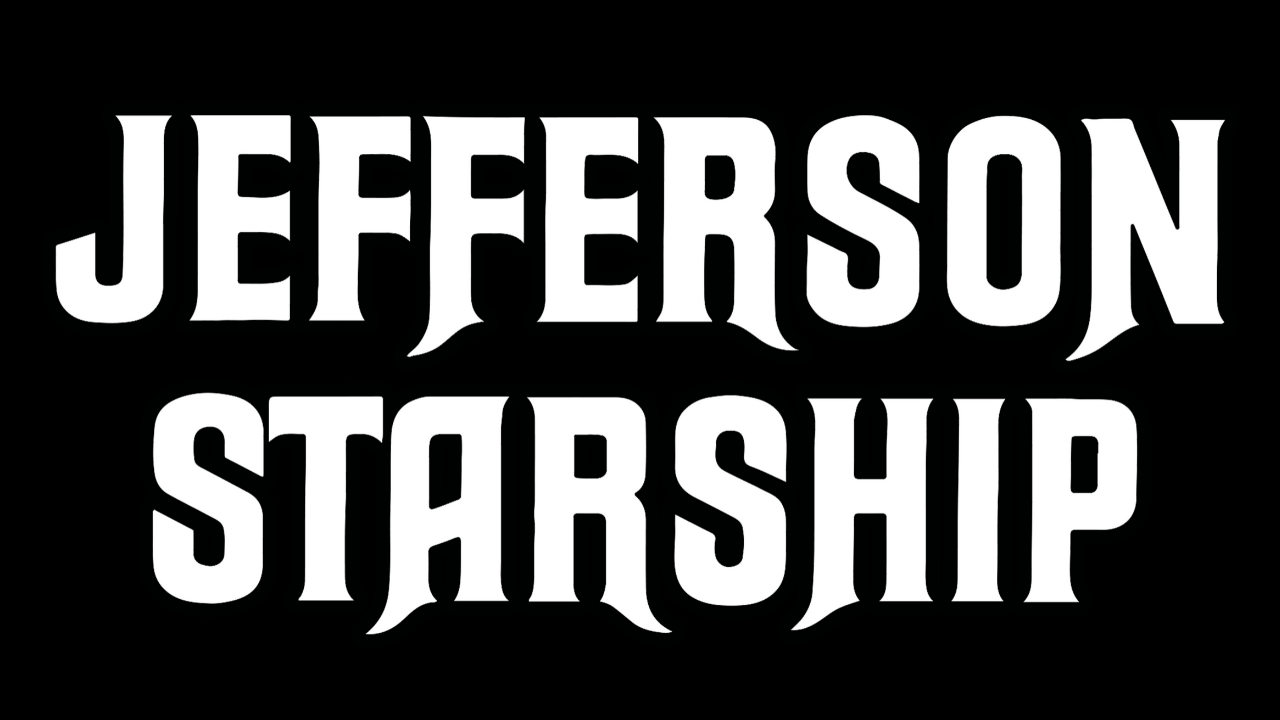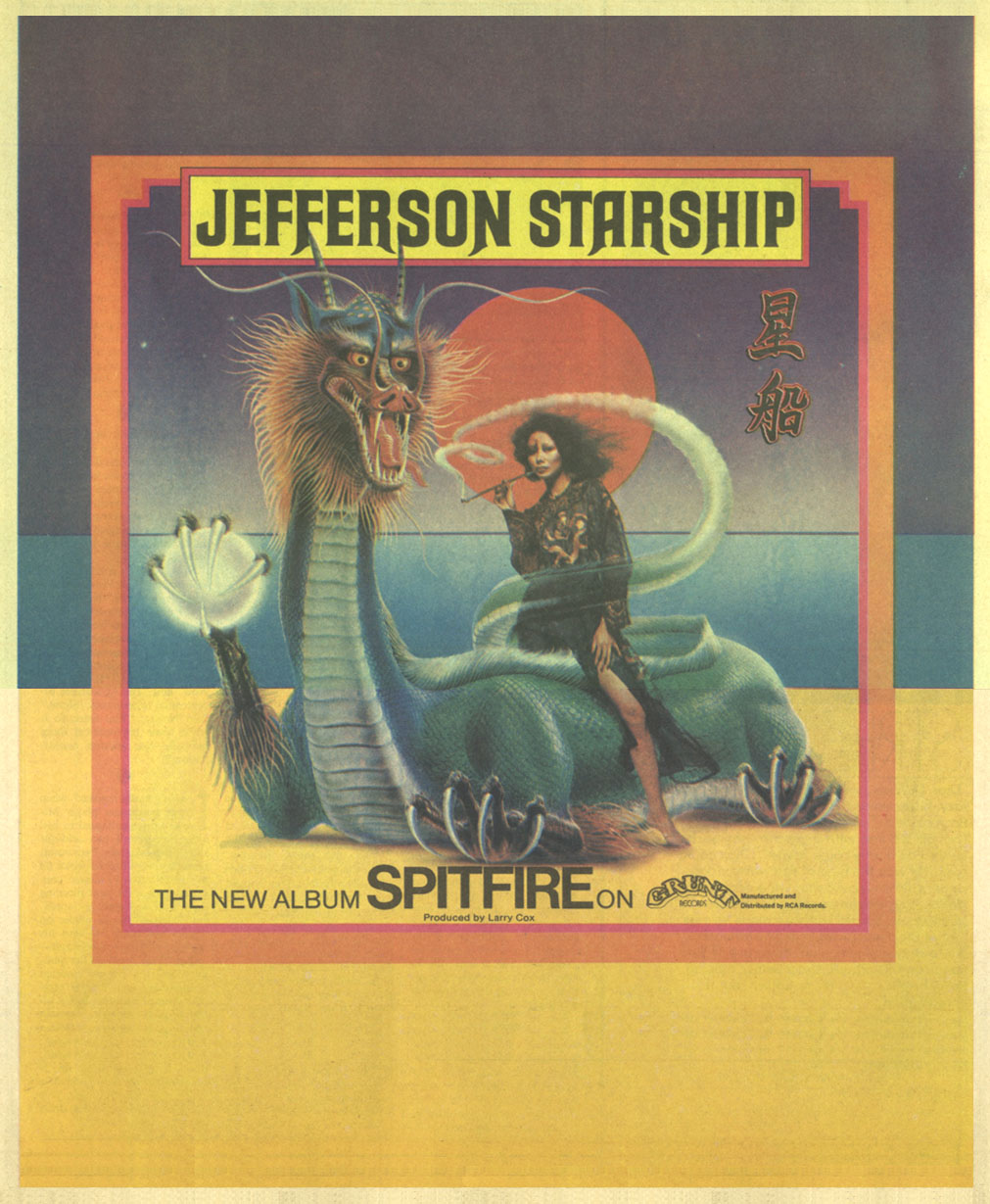Jefferson Airplane Starship - Jefferson Starship is an American rock band from San Francisco, California, formed in January 1974 as the successor to Jefferson Airplane.
The band originally consisted of the five remaining members of Jefferson Airplane, Grace Slick (vocals, piano), Paul Kantner (rhythm guitar, vocals), David Freiberg (bass, keyboards, vocals), Papa John Creach (violin) and John Barbata (dance, voice); with new members Craig Chaquico on lead guitar and Peter Kaukon (brother of Jorma Kaukon) on bass.
Jefferson Airplane Starship

The name "Jefferson Starship" was originally used on Paul Kantner's 1970 album, Blows Against the Empire, and was chosen as the name of a reformed band.
Jefferson Airplane's Paul Kantner Dies, But Medina Show Still On
Former Airplane singer Marty Balin joined the group in January 1975 when he co-wrote and sang the song "Caroline".
The band's line-up remained stable until June 1978, when Slick left the band after Kantner asked him to quit following a show in Germany in which he drank too much and polluted the crowd.
Additionally, Barbata was dropped after sustaining serious injuries in a car accident that left him unable to work.
The remaining members of Jefferson Starship re-formed the band in early 1979, adding drummer Aynsley Dunbar in January and vocalist Mickey Thomas in April.
Jefferson Airplane Co Founder Paul Kantner Dies At 74
Shortly after the band released Nuclear Furniture, Kantner left Jefferson Starship and later sued the remaining band members over ownership of the name in October 1984; the case was settled in March 1985, and the name Jefferson Starship was retired and the remaining band members continued as Starship.
In January 1992, Kantner replaced Jefferson Starship with former KBC bandmates Mark "Slick" Aguilar (lead guitar) and Tim Gorman (keyboards, vocals), former Jefferson Airplane bandmate Jack Casady (bass) and fellow Jefferson Starship Creach, and new members Darby. Gould (vocals) and Prairie Prince (drums).
Kaukon returned briefly in 1994 and Gorman left at the same time; he was replaced first by Barry Flast, th Gary Cambra and finally Terry "T" Lavitz.

Jefferson Starship returned in 2008 with a new studio album, Jefferson's Tree of Liberty, the first to feature singer Cathy Richardson, who had replaced Mangan, and the first since 1984's Nuclear Furniture to feature returning frontman Freiberg, who replaced Balin. .
Catch Jefferson Starship This Weekend At Tropicana In Atlantic City
In September 2012, Jude Gold replaced Aguilar, who had to stop working with the group after being diagnosed with hepatitis C.
On January 28, 2016, Kantner, the only permanent member of Jefferson Airplane and Jefferson Starship, died of multiple organ failure and septic shock following a heart attack a few days earlier.
As of 2016, the band consists of Freiberg (vocals and rhythm guitar), Donny Baldwin (drums and backing vocals), Chris Smith (bass and keyboards), Cathy Richardson (vocals and guitar), and Jude Gold (lead guitar and backing vocals. ).
All Jefferson Starship releases from Dragon Fly (1974) to Nuclear Furniture (1984) except Freedom at Point Zero (1979)
Essential Jefferson Airplane Songs
All Jefferson Starship releases from Dragon Fly (1974) to Nuclear Furniture (1984), a guest appearance on Mother of the Sun (2020) - just three songs
All versions of Jefferson Starship from Dragon Fly (1974) to Earth (1978) and from Deep Space/Virgin Sky (1995) to Jefferson's Tree of Liberty (2008)
The Jefferson Starship version from Deep Space/Virgin Sky (1995) to Jefferson's Tree of Liberty (2008), except Across the Sea of the Suns (2001) Among the architects, drummers and MTV, it would be difficult to choose one veteran. a rock band that made it through the 80s without being forced to change their sound to any degree.

But if acts like Heart and Chicago could alienate longtime fans by pouring on extra hairspray and buying power ballads from outsiders, Starship paid the highest price of all, trading on the Summer of Love ethos. contributed to their original birth, Jefferson Airplane. . , for top 40 singles.
Paul Kantner, Co Founder Of Jefferson Airplane And Jefferson Starship, Dies
The change did not happen overnight. Jefferson Airplane effectively disbanded after 1972's 'Long John Silver' and morphed into Jefferson Starship for 1974's 'Dragon Fly' LP. To say these were transitional years would be an understatement; The plane was often in a state of flux, and so was Starship, as drug abuse, personal conflicts, and disagreements over musical direction often marred the mix.
Lead singer Grace Slick was forced to leave the band in 1978 after drunkenly taunting the crowd during a German gig, soon followed by guitarist/vocalist Marty Balin, leaving co-founder Paul Kantner to find a new singer.
The role would be filled by ex-Elvin Bishop Group singer Mickey Thomas, who first rose to fame after being invited to take on lead vocals on the follow-up to 'Fooled Around and Fell in Love'. Jefferson Starship's next release, 1979's 'Freedom at Point Zero', boasted the top 20 single 'Jane', paving the way for the radio-friendly love songs that eventually became more popular.
With modern keys, powerful guitar riffs and Thomas' smooth voice high in the mix, it's a perfect fit for today's songs by bands like Toto and Boston.
Walk Of Fame Star For Jefferson Airplane Unveiled
The fact that this direction was more or less a 180-degree turn from the counter-cultural stance of Jefferson Airplane's early records was not noticed by the band members, but times were changing and the flower power political ideals of the Airplane quickly ceased to be popular. . like their natural unpredictable (but rarely boring) sound.
It's hard to argue with hits, though, and Jefferson Starship, at least for a while, was able to find a middle ground that kept the band's old guard happy but still embraced FM styles.
Indeed, for a short time it appeared that some of the core members of Jefferson's feud might find something resembling a long-term compromise. Slick returned with several vocal tracks on 1981's 'Modern Times', singing with Thomas on 'Stranger' and adding background vocals to a few tracks; accordingly, the record included a top 40 hit ('Find Your Way Back') as well as 'Stairway to Cleveland', a kiss-off to fans who complained about the change in style.

However, this balance was too weak to maintain. Kantner, in particular, grew frustrated with the group's focus on singles.
Jefferson Airplane/starship Co Founder Paul Kantner Dies At 74
As he told author Jeff Tamarkin in his biography of Jefferson 'Got a Revolution!', "I think they would have failed miserably if they wrote pop songs all the time... The band became more casual and less demanding and not at all something to be proud of. " Eventually things got so bad that, when producer Ron Nevison was preparing the 1984 album 'Nuclear Furniture' for release, Kantner abandoned the master records and held them hostage in his car for several days until he convinced the rest of the band to agree. and different combinations.
Shortly after the album came out, so did Kantner - and he took the 'Jefferson' part of their name with him, part of an out-of-court settlement reached after his resignation.
After Kantner left, instrumentalist/vocalist David Freiberg (who wrote for Jane) also quit the band, leaving the five-piece - with a moniker that had recently been shortened to Starship - to soldier on with their next LP. , 'Knee Deep in the Hoopla' from 1985.
Hired to further the band's quest for radio prominence, producer Peter Wolf (not of the J. Geils Band) brought in material from a roster of outside writers that included Bernie Taupin, Michael Bolton and Katrine and Waves singer Kimberley Rew; only one song, 'Private Room', had the written stamp of any member of Starship.
Jefferson Airplane/jefferson Starship/starship
The music may have been made to order, but the buying crowd responded: "Hoopla" hit the Top 10 and spawned two No. 1 hits ("Sara" and the strong "We Built This City") and a third Top 40 hit ("Tomorrow It Doesn't Matter Tonight"). Most fans who remember Jefferson's days wondered how their group of rock revolutionaries could survive pop singles and corporate-sponsored tours, but as far as Slick was concerned, it was just a gig—albeit a very different one from the old one. day.
"To me, the birth of Starship in the 1980s seemed to be the exact opposite of the 1969 version of the plane," Slick explained in his autobiography, "Someone to Love." "It was as if we had two different professions. These two bands had different orientations, purposes and characteristics; one was a circus, the other a music store.
Band: record an album, shoot a video, work on tour. ... I cut hair, smiled in front of the camera, answered questions from the press, looked at charts, took notes and kept my ass out of jail."

Slick had spent enough time in the trenches to consider a rock 'n' roll 9-to-5 job if he wanted one, but the Starship route continued to end the series. Before the band entered the studio for the follow-up to 'Hoopla', 1987's 'No Protection', bassist Pete Sears found his name being added to a long list of former members.
Jefferson Starship: Strange Times At The Launching Pad
"One day I'm standing on stage with this keyboard around my neck that I hate," Sears would say a year later. "I look at Mickey lying down
Starship airplane, jefferson starship jefferson airplane, jefferson airplane starship greatest hits, jefferson starship vs jefferson airplane, jefferson starship, the essential jefferson airplane jefferson starship starship, jefferson starship concert, jefferson airplane starship hits, jefferson airplane and jefferson starship, jefferson airplane starship discography, jefferson starship tickets, jefferson starship miracles
